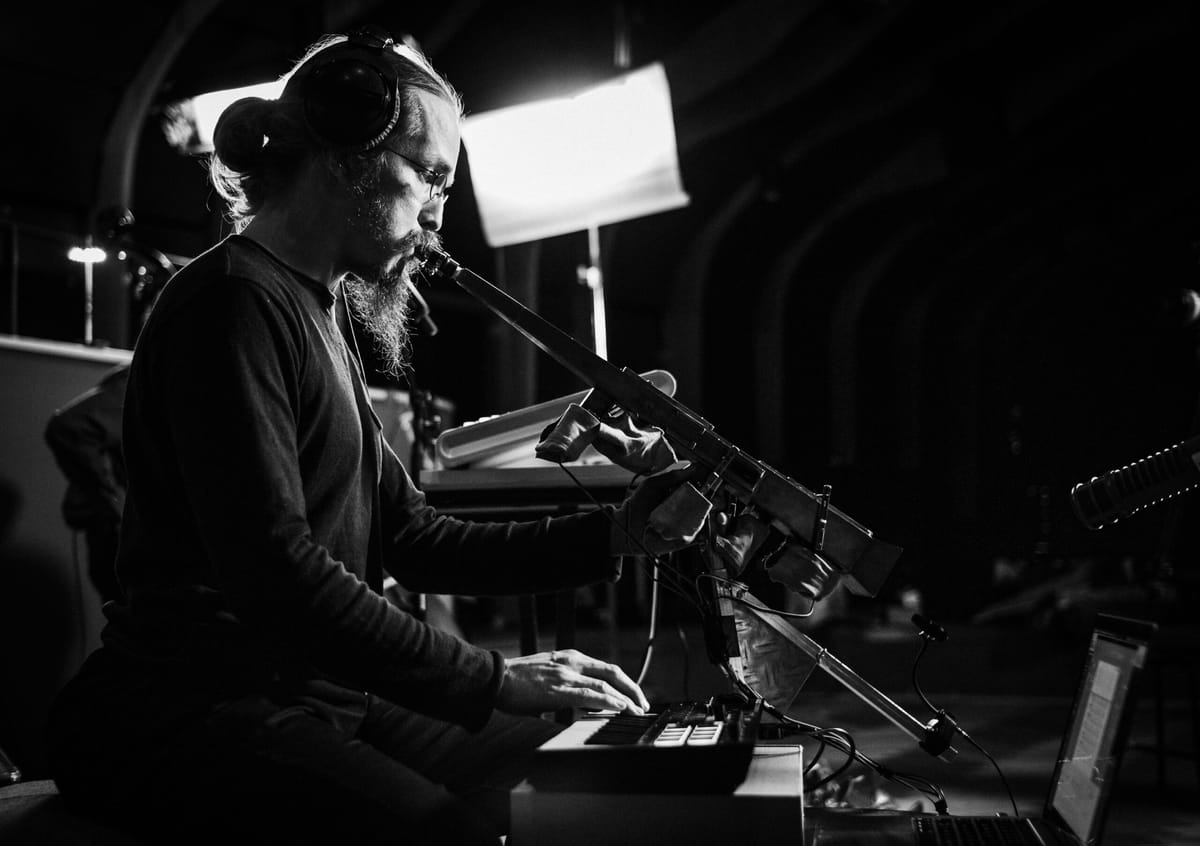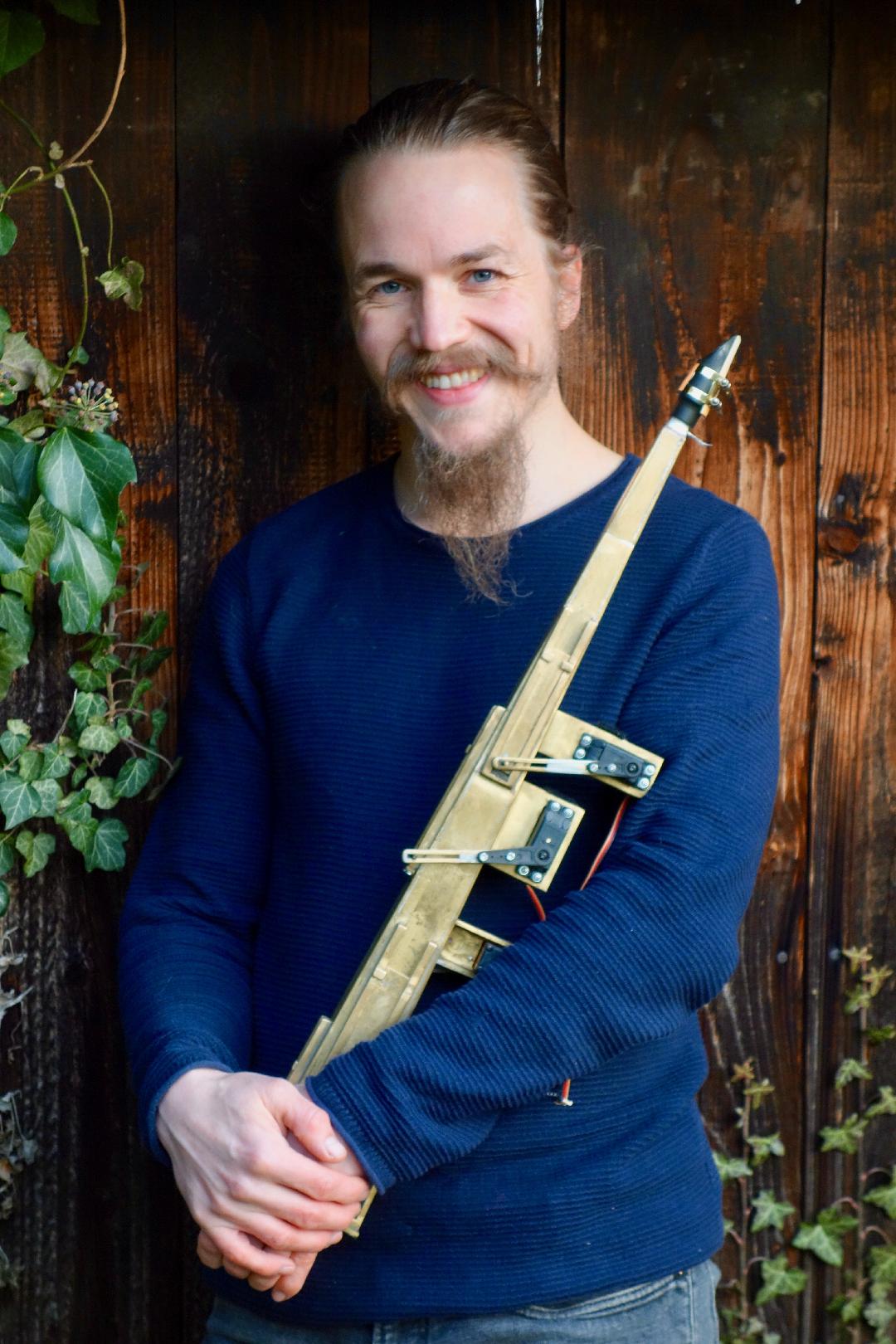“Music is one of the most personal and direct means of human expression.” – Subhraag Singh: In Conversation

Born in Tucson, Arizona, Subhraag fell in love at an early age with jazz greats Duke Ellington, Charlie Parker and John Coltrane. He began playing saxophone at age 11, and was performing professionally by the age of 13. He went on to study with jazz luminaries Lee Konitz, Gary Bartz, and Larry Ridley. As a saxophone player, Subhraag has performed on stages from the Blue Note in New York City to the Centre Pompidou in Paris.
Subhraag lived in India for three years, where he studied with North Indian master-musician Bhai Baldeep Singh. He was deeply influenced by the microtonal scales and spectrum of pitch used in traditional Indian music. His experience in India led him to the conclusion that pitch can be a free and dynamic element of musical expression. Frustrated with the modern music technologies that are focused on utilizing only the 12-tone-chromatic scale, Subhraag was driven to develop new technologies that would enable musicians to utilize “freedom of pitch” in their musical creations. Subhraag’s first creation was a technologically enabled acoustic wind instrument called the Infinitone — the “saxophone of the future”. It won first prize at the 2017 Guthman New Musical Instrument Competition at Georgia Tech. Soon after, he began the development of Infinitone DMT, the groundbreaking plugin that enables all musicians to make micro-tuning an integral part of their creative process.

Serenade Team: The Infinitone DMT software endeavours to bring about a paradigm shift in music, combining the rich nuance of tonal possibility from older music traditions with the modulation, harmonic, and contrapuntal possibilities exemplified in Western music. What inspired you to invent such a software and how do you see this changing the musical landscape in the near future?
Subhraag Singh: To put it simply, I created Infinitone DMT because I wanted to hear beautiful and innovative new music! Music is one of the most personal and direct means of human expression. Because human experience is so rich and nuanced, I asked myself, “Why should the musical creative process be limited to only 12 notes?”
Infinitone DMT microtonal software plugin allows any musician in the world with a computer to break free from the confines of standard tuning systems and use the infinite harmonic spectrum (i.e. the “notes-in-between-the-notes”) to create unique new music. Because pitch is such an essential part of the music making process, I wanted to make pitch exploration easy, inspiring, and accessible for every musician on the planet regardless of genre. I am inspired by many musical cultures around the world that use vibrant palettes of musical notes existing outside the confines of the 12-tone system. We are in a time of great cross-cultural pollination, and for me using only 12 notes feels far too limiting, like a musical prison!
The musical tuning systems of the world all have their advantages and disadvantages. The harmonic-inspired systems of cultures like India use very a colourful, resonant, and high-resolution set of purely tuned intervals. However these intervals are not conducive to the modulation and counterpoint techniques of Western music. 12-tone-equal-temperament became the standard in Western music due to its ability to accommodate counterpoint and modulation, but it was at the expense of purely-tuned intervals.
For the first time, musicians armed with Infinitone DMT, can use purely tuned intervals and do counterpoint/modulation. Rather than being confined to a fixed set of musical pitches, musical pitches can be freely selected in real time in an intuitive manner. Not only can every current genre of music benefit from these new tuning possibilities, Infinitone DMT lays the foundation for a diverse array of new tuning techniques that open the portal to the music of the future!
What does this mean for the future of music? Well I hope it means great things! For musicians wanting to stay within their current genres of music, they have finer nuances of expression available, and they will be able to expand and add richness to the kind of music they are already playing. Moreover, Infinitone DMT opens the door to the discovery of totally new styles of music. With Infinitone DMT musicians are limited only by their imaginations!
ST: When did you start composing? Who were your earliest musical influences?
SS: I started composing as soon as I laid my hands on a piano at around the age of seven. I quickly understood there were so many things I could communicate with music that I couldn’t communicate with words alone. By eight I was writing songs for school projects. Basically I have always been a composer/improviser, it has been my natural impulse for as long as I can remember.
My earliest musical influences came from my father who listened to classic rock the likes of Beatles and Jimi Hendrix. I loved that music. At age 11, I started saxophone in the school band. One day when I was 12, I was listening to one of my father’s jazz recordings, from Wes Montgomery, and in an instant something clicked: I become a life long lover of jazz music. From that point on I discovered Lester Young, Duke Ellington, Charlie Parker, Thelonious Monk, Miles Davis, John Coltrane and many others. Several years later a local record store introduced me to world music of all kinds. Ultimately, I am influenced by any music I hear that inspires me!
As I move into the world of micro-tuning and new music making techniques, my goal is to keep the essence and inspiration from all the great music I have heard in my life. Sometimes it is easy to forget about musical expression in the pursuit of technical development, however it is my goal that both technology and human expression work in synergy.
ST: What are your main compositional challenges at present?
SS: My main compositional challenges are internalizing the new tuning systems I am discovering so I can hear them and understand them in full detail and nuance. With Infinitone DMT software, it is really easy to discover new scales and chords, and to instantly begin creating interesting new music with them using synthesizers. Literally every day I find exciting new sounds that I have never used before. However, I am also longing to explore some of these new scales in much greater depth and learn to play and sing them by ear.
I think it is when musical notes are completely internalized, that they are able to communicate a much greater depth of expression. A great Indian classical musician can play hours on a single scale and it never gets boring! New depths of a singular rag can still be uncovered even after hundreds or thousands of years of exploration. So along with exploring a wider variety of new scales in my music, I am also trying to pick a few scales to focus on more specifically on so I can get to know them better.
Another challenge for me is learning the art of digital music production. As a saxophone player, I just would pick up my instrument and play. But learning to record and arrange in a digital environment, mixing synthesizers and acoustic instruments, is a high art of its own, and it is taking me a lot of time to learn this new domain.
ST: What expectations do you usually have from listeners of modern compositions?
SS: I place more expectations on the composer/performers than I do on the listeners. If the music is good and powerful, people will listen! If it is not, people won’t. Some composers complain that “audiences don’t appreciate their music”. It is true that some music is ahead of its time, and listeners might not appreciate it yet. However, I feel largely that is not the case. I think most of the time, if people are not listening and appreciating the music, the composer/performers should aim to achieve an even higher level of musical composition/performance!
ST: With the invention and wide-scale adoption of several music streaming services, we are living in a world that has ample music options. In such a scenario, how would you value music? Do you think audiences are valuing it differently in the 21st century?
SS: I think music streaming is a very powerful tool. However with any power, it can have paradoxical implications and can be used for good or for bad. On one hand, many musicians get cheated out payment for their work due the low amount of money streaming services give them. On the other hand, it is possible to discover astounding new music that one would never have found before. I find it is much easier to find new music that resonates with me, and skip over music that I don’t care to listen to. For example, a few days ago I discovered some amazing Gnawa music that I just love and have been listening to daily. I would have never found such music before streaming!
There are some services, such as Bandcamp, in which the artist does get compensated very well for their work. After I found the Gnawa music on a streaming service, I went to the Bandcamp page and purchased it to have the high-res file in my collection.
What also is wonderful is there is now no gatekeeper at a record company controlling which music can get heard and which not. Every musician in the world now has a chance to be heard! There are musicians winning Grammys for recordings they made in their bedroom. The paradoxical side of that is it can be hard to filter out the onslaught of mediocre music out there to truly find the gold. It can still really help to have friends to recommend good new music. There is a great danger of no music ever really being appreciated anymore, because it gets diluted by the masses of other music out there. There is also the great possibility to radically increase the value of music through more detailed and conscious listening and personal support. I really hope music lovers are able to discover amazing new music created with Infinitone DMT as well!
If we find new music we love we can value it personally through in-depth exploration, then we can go on to support the artist by attending live performances or through a service such as Bandcamp. I think the value of streaming is ultimately in the hands of the individual musicians and listeners and how they choose to use it.





